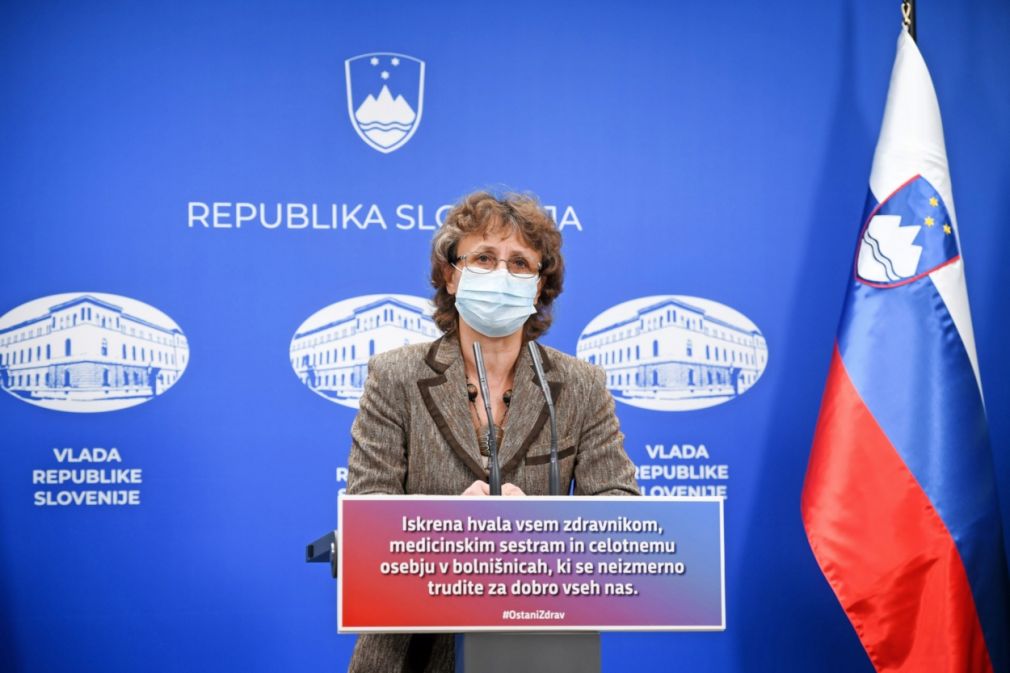by Z.T.
The press conference on the current situation regarding the COVID-19 disease was attended by dr. Nuška Čakš Jager from the National Institute of Public Health, prof. dr. Borut Štrukelj from the Faculty of Pharmacy in Ljubljana, and the government spokesman, Jelko Kacin.
The government spokesman, Jelko Kacin, commenced the press conference by announcing that at yesterday’s correspondence session, the government adopted a decision to extend the state of epidemic in the Republic of Slovenia for 30 days. The ordinance extending the state of epidemic will enter into force tomorrow, Wednesday, 18 November. The state of epidemic should not be equated with the tightening of conditions; namely, the declaration of epidemic is a legal framework that forms the basis for action, including the activation of civil protection and other available forces, in order to contain the spread of infection.
Current epidemiological data shows that the situation in hospitals remains serious. On Monday, 1,388 new infections were confirmed from 5,326 tests; the share of positive tests was 26%; 1275 people needed hospitalisation; 208 patients needed intensive care; 45 people died as a result of Covid-19 infection.
According to Nuška Čakš Jager, deputy head of the Communicable Disease Centre at the NIPH, the number of new coronavirus infections continues to rise worldwide. In Europe, only the Czech Republic, Austria, and Luxembourg have a higher two-week cumulative incidence rate of Covid-19 per 100,000 population than Slovenia. Only the Czech Republic, Belgium, and Hungary have a higher incidence of death. According to the latest data, the two-week cumulative incidence rate of Covid-19 per 100,000 population in Slovenia is 932.
Čakš Jager explained that the share of infections in the active population has decreased, while infection among the elderly, including in old-age homes, is increasing. There were 242 infection cases in elderly care homes by 4 October, and 4802 infection cases by 15 November, said Čakš Jager. According to the NIPH representative, the infection among schoolchildren was most widespread among high school pupils, while kindergarten children made up a relatively small proportion of cases. According to the NIPH, there are currently more than 19,000 active infected cases in Slovenia.
In Slovenia, 26% have tested positive from PCR tests performed on a daily basis. The number of coronavirus infections is increasing, especially in the Gorenjska and Pomurska regions. Čakš Jager also called for the uploading of the TAN code to the #OstaniZdravin app, and urged people to stay-at-home.
Borut Štrukelj from the Faculty of Pharmacy in Ljubljana participated at the press conference by presenting the current stage of vaccine development in the world. He said that we currently have 54 vaccines in the clinical phase of research, i.e. in the first, second, or third phase. 12 vaccines are in the third phase, but not a single vaccine has yet been approved by regulatory authorities such as the European Medicines Agency (EMA) or the US Medicines Agency (FDA).
Moreover, he said that there are currently six vaccines provisionally approved by national agencies – two in Russia (a third vaccine is currently in the phase of approval), and four in China. Chinese and Russian vaccines have somehow skipped the third phase of clinical trials, and there is insufficient data available in this respect, added Štrukelj.
Source: gov.si

